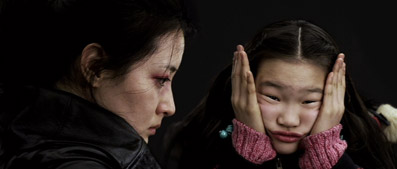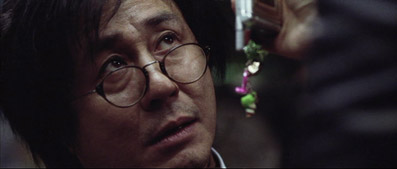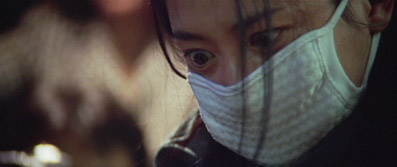|
There seems to have been almost a consensus that the third
of Park Chan-wook's famed Vengeance
Trilogy is the weakest of the three. I say
'almost' because it definitely has its supporters and a few even regard it as the best of the bunch. I'm prepared to
concede that it lacks the sheer inventiveness and pace of
Oldboy
and the purity of vision of Sympathy
for Mr. Vengeance, but it still wipes the floor with most revenge themed films from the
West in recent years (I'll make an exception for Gasper
Noé's extraordinary Irréversible).
And if it trips up just occasionally, it still packs the
sort of punch that should keep the Mills and Boon brigade
at a comfortable distance.
After
two films in which males characters go head-to-head on the
vengeance trail while the women get caught in the flotsam,
it's certainly refreshing to see a female character take
centre stage with a plan every bit as patiently thought
out as the one in Oldboy. The difference here
is that the purpose of her quest is not held back for
climactic revelation – 38 minutes in and she spills everything
to a co-worker she's brought home for emotionless sex. Mind
you, that's 38 minutes of small clues and gradual revelations
– it takes a while to realise that Lee Geum-ja, young child
murderer turned model prisoner and impossibly angelic Christian,
may have reasons beyond sociopathy for her intended actions.

There's
a strand of jet-black humour running throughout the whole Vengeance Trilogy,
but Lady Vengeance (Chinjeolhan
geumjassi, aka Sympathy for Lady Vengeance) opens on what for
my money is the funniest image I've yet seen in a Park Chan-wook
film, as a Korean Christian group all dressed in Santa Claus
outfits stomp their feet against the cold and at the
moment of Geum-ja's release burst into exuberant, tambourine-slapping
song. Their wide-eyed, page boy-haired leader then offers his
morally transformed disciple a plate of pure white tofu,
a traditional meal for those turning their back on the sins
of their past. Geum-ja sullenly tips it to the floor and
tells him to go screw himself. It's hard not to like her
from the off.
A
dual-timeline narrative then unfolds. Geum-ja meets up with her
ex-cellmates (textually identified by name and time served)
and calls on favours accrued during her jail time, where she ended the reign of terror of the cell's queen bitch by tripping her on soap and then feeding her poison, something we learn about through extended flashback. For some, the requests are cheerfully
undertaken – the doting husband-and-wife bank robbers who
build a gun from Geum-ja's plans – while for one the required
task is considerably more unpleasant. A level of intrigue
is provided by this approach, but there is little of the
storyline mystique and cat-and-mouse game-playing that made
Oldboy such an intellectual rollercoaster
ride. Geum-ja has only one purpose, to hunt down a man named
Mr. Baek and kill him, a desire visualised in bizarre dream
sequence in which Geum-ja drags a dog-man mutation of Baek
strapped to a sledge, then stops to blow his brains out through
his rear end.
All, however, does not run as expected, as Geum-ja's curiosity over
the fate of her young daughter temporarily sidetracks
her to Australia. Considerably more surprising is how
quickly she nails her prey, leaving you wondering just where the hell the film will go from there. It's from this point that Park
begins firing on all cylinders in a supremely uncomfortable
final act that, with some disturbing home video footage providing seeming justification for a particulary grim undertaking, the moral and emotional consequences of committing we are then confronted with. It's a darkly superb sequence, exemplified by a
corridor shot in which a line of people sit waiting for...
no, you need to see this to appreciate it.

There's
no doubt that the film is more obviously playful than its
predecessors and although this doesn't always come off – as with the frankly clunky idea of spelling out words in
the clouds for Geum-ja's daughter Ma-nyeo – there a moments
when the wit is purely and delightfully cinematic, most
memorably when Ma-nyeo blackmails her way to Korea in three
static shots, a sequence that almost looks lifted from Kitano Takeshi
(whose editing style, it should be noted, Park has
expressed admiration for). A number of almost throwaway
ideas are also memorable, my favourite being the artistic
ex-cellmate who makes a living creating small sculptures
of vengeful women holding a man's severed head, whose face she will tailor to the client's wishes.
As
ever, the lead casting is deliciously off-the-wall, with
the icily unemotional Geum-ja played by Lee Yeong-ae, an
actress known for her beauty (she has the curious nickname 'The
Oxygen Woman') and famous across Asia for her lead role
in the long running Drama series The Jewel in the
Palace (Dae Jang-geum). She was
chosen by Park in part because she was the last
person that other filmmakers would have cast in the role, and he equates
it with the idea of seeing Audrey Hepburn playing a vengeful
killer. As the object of Geum-ja's vengeance, Choi Min-sik
clearly relishes playing the bad guy, and the
supporting roles are all memorably performed, notably Kim
Byeong-ok's dedicated, despairing preacher and Ko Soo-hee's
prison cell bully Ma-nyeo, an experienced theatre actor
in her first film role. Sympathy for Mr. Vengeance
and Memories of Murder star Song Kang-ho
has a cameo role as a hired goon that's so brief and darkly lit that you'll have to be sharp to spot him.
As
the rejected symbolic purity of the opening tofu returns
as falling snow and a white cake to be gorged, there is
a sense of failed redemption that falls some way short of
the gut-punches delivered by Mr. Vengeance
and Oldboy, an ending that although
appropriate for this story has clearly not sat so well with
some of the trilogy's fans. Certainly the symbolism here
is a little heavy-handed, especially following on from a
bathroom-based spiritual encounter that spells out things
that may have been better just suggested. But these are
small uncertainties in an otherwise fine film that, while
inevitably overshadowed a little by its pitch-perfect predecessors,
is still a stylish and blackly humorous tale of revenge, consequence
and moral and ethical self-destruction that provides a the
Vengeance Trilogy with a fittingly idiosyncratic final salvo.
It
seems a little peculiar that the most recent film in the Trilogy
should have the weakest transfer, but such is the case here.
Framed 2.35:1 and anamorphically enhanced, this is clearly
an NTSC to PAL conversion, but unlike the one on the Sympathy
for Mr. Vengeance disc, the image has suffered
a little in the process. Contrast is variable, better
in brightly lit scenes than at night, and there are times
where, even allowing for the film's use of specific hues
in set design and filtration, the colours do not look quite
true. Sharpness is also a notch short of ideal, but again
this can vary depending on the contrast.

The
expected three soundtrack options of stereo 2.0, 5.1 surround
and DTS surround are all on offer, but are all surprisingly
flat, having none of the in-your-ear wallop of the DTS tracks
on the previous two films. Front separation is sedate at
best and the surrounds rarely have much to say. It doesn't
detract from the film, but is a little surprising.
Director
Interview (42:11)
As with the director interview on the version of Oldboy
found in The
Vengeance Trilogy set, the interview here is
conducted through an interpreter, so we effectively have
twenty-one minutes of material delivered twice, once in
subtitled Korean and then again in English. The questions are quite
good, though, and the answers sometimes illuminating.
Original Theatrical Trailer (1:46)
A UK trailer that tells you up front what's going on between
Geum-ja and Mr. Baek, which somewhat spoils the surprise
if you want to go in not knowing. I'd give this a miss until
after the film.
Although
just falling short of the standard set by the first two
instalments of the Vengeance Trilogy, Lady Vengeance
is still absolutely worth your while, for its initially
playful approach, for its characters and oddball elements,
and for the way it provides you with motivation for
vengeance then confront you with the realities of
actually carrying it out. Tartan's DVD is not all it should
be, with a disappointing transfer and little in the way
of extra features, at least compared to the Oldboy
double disc set.
|